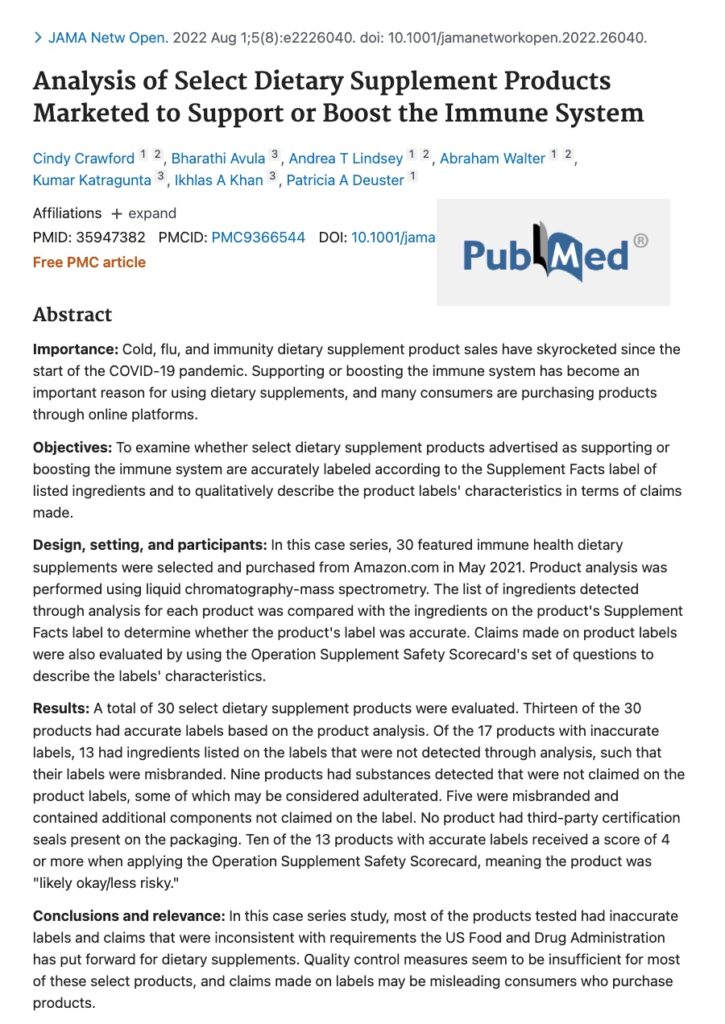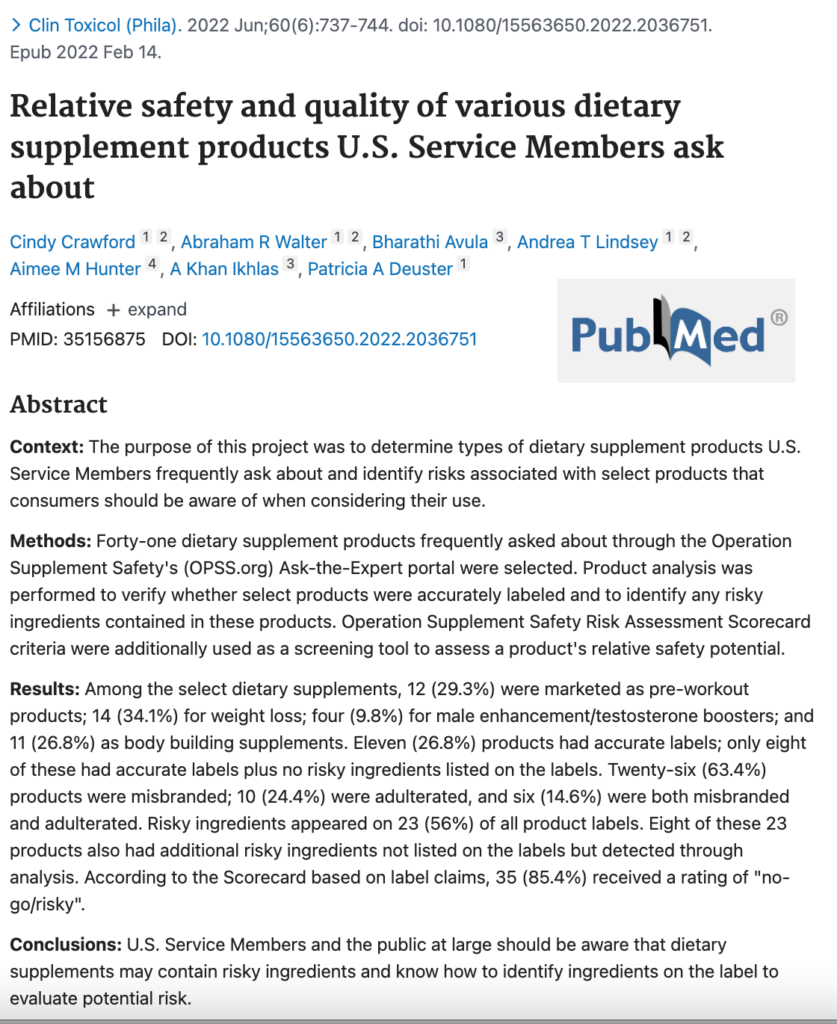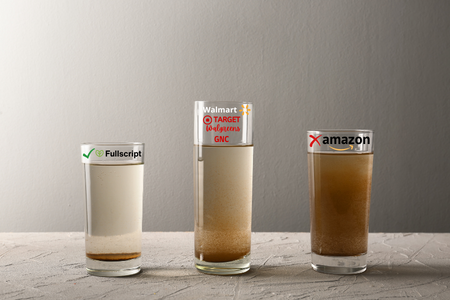
Secure Ordering | Free Shipping | 20% Off Retail Prices
Along with providing information on whether supplements might be right for you, this article also links to Fullscript where you can buy supplements online through Fullscript’s secure healthcare formulary and get free shipping and 20% off the retail price of professional-grade supplements.
The Supplement Sciences website was created to provide reliable sourcing for quality nutritional supplements. We are told to seek out quality brand supplements, but this is more challenging than it sounds. Even if objective company vetting information were available, who would have the time? This article discusses some of the incidents of counterfeit supplements on online platforms as well as in retail chains. We want you to know about a better source for ordering supplements: Fullscript.
Currently, people are relying on open online marketplaces that allow all brands with a business licence, be they good or bad. People buy from discount product lines with potentially hundreds of suppliers. With so much money changing hands, how could the supplement industry not attract a lot of bad players.
Through Supplement Sciences, you have access quality brands fully vetted by Fullscript, a secure professional-grade supplement formulary that only carries the top-quality brands. With Supplement Sciences, you’ll receive 20% off the products retail prices every time with free shipping on orders over $50. Fullscript provides assurance that what’s on the label is what is actually in the bottle. No more gambling with your health.
Why Do We Even Trust Supplements?
Many people mistakenly believe that the FDA polices the dietary supplement industry. The Dietary Supplements Health and Education Act of 1994 regulates the dietary supplement industry, but it is widely criticized as being inadequate to protect consumers. Unlike FDA’s regulation policies for drugs, dietary supplement regulation does not require the FDA to conduct product or safety testing. The FDA only takes action against a dietary supplement if it is found to be unsafe after it is on the market.
This begs the question: How do any of us really know that our herbal supplements aren’t just grass clippings? How do we know that the white powders aren’t rice flour? How can we trust that the supplements sourced from China don’t come from contaminated sources? After all, it’s hard to imagine an uneducated and unregulated herb grower in rural China would hesitate to spray pesticides. Producers could easily turn a blind eye to high lead when sourcing their mineral supplements. Chinese parents know better than to buy formula produced in China (knowing conditions continue that produced the Formula Scandal back in 2008. This incident, though it didn’t involve supplements, tells us something important about the profit motive, lack of regulation, and low safety standards outside of the US. You will often see the “Made in China” label in major discount retailers.
But even when a supplement says it’s “packaged” or “distributed by” a company in the United States, it doesn’t necessarily mean the product or its ingredients originated in the U.S. The raw materials or ingredients could have been sourced from anywhere. This creates “plausible deniability”. This means that if something turns out to be fake, the supplement company can just point a finger at the supplier and feign innocence. It allows them to shop for the lowest prices (even impossibly unrealistic low prices) and offer lower cost products than are possible with quality brands.
Personal Experience With Fake Supplements
There’s nothing like a few personal experiences to bring home the point that price shopping on an open product marketplace is not the way to go when it comes to supplements. Two instances have provided evidence to convince me to personally avoid online product marketplaces and even most websites for dietary supplements.
The first experience was with a $49 bottle labeled NMN bought on the main online marketplace. It looked perfectly legitimate and there was no reason to question the lemon flavor. That is, until the Harvard researcher, David Sinclair casually commented about the fake NMN problem and mentioned that real NMN tastes like burnt popcorn. So the “NMN” lemon drops were fake-as were 65% of the NMN supplements advertised there–see below.
My second instance of wasting money on fake supplements didn’t involve an online marketplace, but a product purchased directly private company’s website. Many private lines of supplements offer a wide range of products at discount prices. After buying a 5 oz package of bland pure white powder labeled “Resveratrol with Vitamin E”, it came to my attention that resveratrol actually has a yellowish off-white color and will generally oxidize to a reddish-brown color. The pure white powder I purchased for $39.95 tasted exactly like rice flour and never oxidized even after many months.
These are just my own experiences. Let’s move on to other documented instances of fraud appearing in news stories.
Research Shows 13 Out of 30 Products Accurately Labeled

Another Study Shows 63%Misbranded and 24% Adulterated
A 2022 study looked at supplements of interest to us service members. Of the 41 products tested, twenty-six (63.4%) products were misbranded; 10 (24.4%) were adulterated, and six (14.6%) were both misbranded and adulterated. Risky ingredients appeared on 23 (56%) of all product labels.

NOW Brand Supplements Faked
Neutraceutical Insider reported on the April 2023 story involving a number of the NOW brand supplements being counterfeited.
NOW, recently conducted an investigation into counterfeit supplements being sold on an online marketplace. They discovered that a company operating under the name A2X1 had sold 11 different fake NOW supplements on one platform for approximately two weeks. These counterfeit supplements imitated the NOW brand as well as another well-known supplement brand, but had falsified packaging, labels, and contents. NOW was alerted to the issue by concerned consumers who had purchased suspicious NOW-branded products. Each counterfeit product contained small white capsules with odorless white powder.
To determine the contents of the capsules, NOW analyzed the white powders and found that they contained white rice flour. The company also discovered trace amounts of Sildenafil (Viagra) in some of the samples. NOW has reported this finding to the U.S. Food and Drug Administration.
Fake: 65% of NMN Supplements Faked
ProHealth Longevity published this article, in which they discuss their (2020-2021) investigation into adulterated and counterfeit NMN products sold on one of the online marketplaces. They discovered that many of these products had fake Certificates of Authenticity and other documentation. Consumer Lab and other parties have now reported similar findings.
During their research, ProHealth Longevity found that more than half of the NMN products tested contained no NMN at all, while others had less than 80% purity. Some suppliers were selling low-cost vitamin B3 as NMN.
Consumer Lab tested the 21 NMN brands with the highest market share on the marketplace and found that only three of the brands contained their claimed amounts of NMN. Consumer Lab notes that many of the products that contained virtually no NMN had hundreds or thousands of positive reviews, raising questions about how those reviews were obtained.
A Long List of Counterfeits and Contamination
Here’s a general idea of past issues related to contaminated or counterfeit supplements on online retailers:
- In 2023, the Food and Drug Administration (FDA) issued a warning letter to Amazon regarding tainted supplements purchased from their online store. Through laboratory analyses, the FDA confirmed that seven different supplements marketed towards supporting male energy contained the pharmaceutical ingredients tadalafil or sildenafil.
- In 2020, a Consumer Reports article discussed FDA’s warning to consumers to avoid certain weight loss and sexual enhancement supplements sold on online marketplaces. The FDA tested 46 products and found that all contained undeclared pharmaceutical ingredients, including sildenafil (the active ingredient in Viagra), tadalafil (Cialis), and vardenafil (Levitra), as well as other substances not listed on the labels. Several of the products were labeled as “#1 Best Seller” or the “Choice” product. While both these online retailers have pledged to remove the products from their sites, this is the latest in a string of studies finding undisclosed drugs in dietary supplements.
- In 2018, the FDA warned consumers about the presence of hidden and potentially harmful ingredients in some dietary supplements sold on online retailers. These products were promoted for weight loss, muscle building, and sexual enhancement but contained undeclared ingredients that could be harmful to consumers.
- In 2019, there were reports of counterfeit Align Probiotic supplements being sold on one of the online retailers. The counterfeit products had different packaging and lacked the authentic lot codes and expiration dates. Procter & Gamble, the manufacturer of Align, worked with the retailer to remove the counterfeit listings and protect consumers.
- In 2020, there were concerns about the quality and authenticity of some vitamin C supplements sold online, as the COVID-19 pandemic led to a surge in demand for immune-boosting products. Some customers reported receiving products with poor packaging, inconsistent quality, or questionable origins.
- In 2019, a study published in the Journal of the American Medical Association (JAMA) found that more than half of the dietary supplements sold on one of the online marketplaces contained unapproved and potentially dangerous ingredients. The study analyzed 1,000 popular supplements and found that many products contained undeclared pharmaceuticals or other compounds that could cause serious health problems.
- In 2021, the U.S. Department of Justice indicted a New Jersey man for allegedly selling misbranded and adulterated dietary supplements on online retailers. The supplements were marketed as natural remedies for various ailments but contained prescription drugs and other unapproved ingredients.
- In a 2022 study focused on immune supplements, only 13 out of a total of 30 products were evaluated had accurate labels based on the product analysis. [PMID: 35947382]
- A number of herbal products have been reported to contain lead. A study in 2009 confirmed that women who had reported taking herbs in the previous month did show higher lead levels. [PMC2771230]
Mushroom Supplements: A Special Case for Caution
While adulteration and contamination with heavy metals and allergens are important, mushroom supplements are particularly concerning because of the potential for fatal misidentification of mushroom species. Whole Foods Magazine published an article in which counterfeits of four of the Host Defense brand of mushroom supplements were being sold on the marketplace.
Open Online Marketplaces May Be Impossible To Secure
Even if these businesses want to clean up their marketplaces, there’s some doubt that such efforts can be effective. A couple of quotes from an article in Natural Products Insider should make clear just how difficult and costly it would be to police a large platform.
“THERE’S OVER 10,000 BRANDS ON [THE MARKETPLACE] JUST IN THIS CATEGORY, AND WE’RE SEEING MANY, MANY HUNDREDS OF THOUSANDS OF PRODUCTS”
— Daniel Harari, general manager of e-commerce solutions for SPINS, and co-founder of ClearCut Analytics
“We think of the retailers as gatekeepers, and we’ve had concerns that [they don’t] hold those same standards. When we can assume that [one online retailer]is 70% of e-commerce and, by 2024, e-commerce will be a quarter of all supplement sales, what are our concerns within the industry when the retailers and buyers aren’t acting as those gatekeepers?”
Claire Morton-Reynolds, senior analyst for the Nutrition Business Journal
Walmart, Walgreens, Target and GNC Also Found Selling Fakes
A few years back, New York Attorney General’s office investigated herbal supplements sold on online marketplaces and other retailers and found that many products did not contain the advertised herbs or contained other unlabeled ingredients. The investigation led to a settlement with four major retailers to improve quality control and labeling practices.
In the 2015 story, the Attorney General of New York, Eric T. Schneiderman, warned four major retailers, GNC, Target, Walmart, and Walgreens. Warning letters said the retailers sold store-brand herbal supplement products in New York that did not contain the labeled substance, or that had drugs or ingredients not listed on the labels. The retailers were asked to stop selling certain popular products, including Echinacea, Ginseng, and St. John’s Wort. Schneiderman also requested that the companies provide detailed information about their herbal supplements’ production, processing, and testing, as well as explain quality control measures in place.
The AG’s office investigation was stunning. Only 21% of the test results from store-brand herbal supplements verified DNA from the plants listed on the products’ labels, while 79% either came up empty or verified contamination with other plant material. Walmart had the poorest showing for DNA matching products listed on the label, with only 4% of the Walmart products tested showing DNA from the plants listed on the products’ labels.
Schneiderman said, “This investigation confirms long-standing questions about the herbal supplement industry. Mislabeling, contamination, and false advertising are illegal and pose unacceptable risks families, especially those with allergies to hidden ingredients.
A Better Way to Buy Supplements Online
The Fullscript online professional grade formulary is a better option for online supplements for several reasons. First, Fullscript guarantees the freshness of their products, ensuring that supplements are far from their expiration dates when they reach the consumer. Additionally, Fullscript has a secure supply chain, meaning that products are stored, packaged, and shipped in a controlled environment to prevent degradation or contamination.
Fullscript also offers professional-grade brands that are not available on other platforms, providing a wider range of high-quality options for healthcare professionals and their patients. While retail prices may be slightly higher than those on open online marketplaces, the 20% discount offered through the Supplement-Sciences.com website are highly competitive. The security of knowing that you are getting what is listed on the label makes it worth the investment. No heavy metals, no unlisted drugs, no rice flour counterfeits.
Best Buy Online:
- All Quality Brands
- Always 20% off Retail
- Free Shipping over $50
- No Spam Email
- Wide Variety of Brand Options & Dosages
- Guaranteed Freshness
Easy Sign-up:
- Name
- Phone
- Secure Confidential Platform
- Friendly Phone Support

 Scan Me!
Scan Me!

